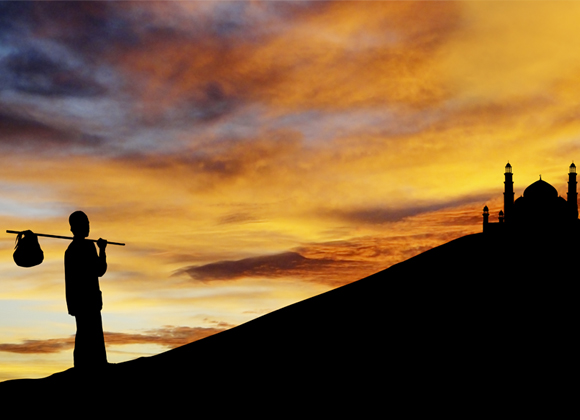
The sum total of Islamic laws that were revealed to the prophet Muhammad (![]() ) and recorded in the Quran, in addition to the deduced laws from the prophet’s divinely-guided lifestyle (the Sunnah), did not come down to a council of ministers. Rather, it was designed to be applied and established by every Muslim, beginning with their own behavior, their own family and of course towards their own community.
) and recorded in the Quran, in addition to the deduced laws from the prophet’s divinely-guided lifestyle (the Sunnah), did not come down to a council of ministers. Rather, it was designed to be applied and established by every Muslim, beginning with their own behavior, their own family and of course towards their own community.
Ibn ‘Umar (
) reported that the prophet (
) said, “All of you are guardians and are responsible for your subjects. The ruler is a guardian of his subjects, the man is a guardian of his family, the woman is a guardian and is responsible for her husband’s house and his offspring; and so all of you are guardians and are responsible for your subjects.” (Al-Bukhari and Muslim).
Each Muslim is responsible for their own united state, to establish the orders of Allah first and foremost before directing such orders to others. As indicated in the hadeeth above, this responsibility is not unique to the ruler and is certainly not a trust specialized to a council of ministers. Many people confuse the responsibility of establishing Shariah (Islamic laws) to heads of Islamic states, when in fact it was meant to be upheld the other way around.
“And whoever does not judge by what Allah has revealed – then it is those who are the disbelievers.” (Al-Ma’idah, 5:44)
“And whoever does not judge by what Allah has revealed – then it is those who are the wrongdoers.” (Al-Ma’idah, 5:45)
“And whoever does not judge by what Allah has revealed – then it is those who are the defiantly disobedient.” (Al-Ma’idah, 5:47)
In the above verses, the word ‘whoever’ is directed to the masses of believers, and the Quran came explicit and straightforward when mentioning the rule and judgement of shariah laws over humankind, not forgetting that Allah ![]() stated that He will not change what is in the people until they begin to change what is in themselves.
stated that He will not change what is in the people until they begin to change what is in themselves.
“Indeed, Allah will not change the condition of a people until they change what is in themselves.” (Ar-Ra’d, 13:11)
To establish the divine laws of Allah ![]() in the state of the self is a start, and the first condition without which there will be no development or change.
in the state of the self is a start, and the first condition without which there will be no development or change.
If a ruler was able to establish Islamic shariah by force without responsiveness from his people and without special vim from individuals to apply and establish Islamic laws in themselves, that ruler will not amount to anything, and change will only be a superficial one.
Today we see Muslims being pushed into a bigger and more universal trial. We see Muslims killing other Muslims in almost every part of the world. Others carry the flag of ‘No God but Allah’ and butcher each other in Lebanon, Iraq, Iran, Syria, Libya and expanding to further neighboring countries.
Shariah law is not a matter of emotion, passion and whims – it is a real and dear necessity that requires honest intentions. Beginning with the ones who demand for its establishment, where the masses respond to the hierarchy of rulers and where reform comes and dwells with ease and gradation.
We live in times of common plagues, similar to the times when alcohol was a common plague, during times of ignorance (pre Islamic era). The verses forbidding alcohol consumption came, after a process of gradation, that took stages of more than 12 years before it actually became absolutely forbidden. This was a lesson from Allah ![]() to teach us the resilience and flexibility of divine laws and its convenience in all circumstances and situations.
to teach us the resilience and flexibility of divine laws and its convenience in all circumstances and situations.
Shariah law is not just about crime limits and punishments, shariah law is justice and mercy. It is knowledge and action. Allah ![]() ordered us with knowledge in more than a thousand verses in the Quran, and ordered to cut off the hand of a thief in one verse! The first of all orders in Quran was:
ordered us with knowledge in more than a thousand verses in the Quran, and ordered to cut off the hand of a thief in one verse! The first of all orders in Quran was:
“Read, in the name of your Lord who created …” (Al-‘Alaq, 96:1)
And despite this straightforward order to read, an order that has the utmost priority in Islam, we are a nation that does not read or reflect! That is why seeking knowledge is a demand, and the good understanding of Allah ![]() is a condition to establish His laws.
is a condition to establish His laws.
So what is shariah?
It is all of the above. It is knowledge and action; justice and mercy. It is not just about limits and boundaries. And what are boundaries but security and protection from what harms the tent of Muslims. Shariah as a whole, is bigger than the issue of boundaries. It is the law of general mercy, the law of love and the constitution of the development and growth of the Islamic society.
True Islam has no door for hatred and violence, and has no place for whims and trading with minds.
Let each one of us establish and apply shariah laws on ourselves first. Let us apply it in our actions and our homes. Only then will Allah ![]() change what came upon us as a nation, and that is the promise of Allah
change what came upon us as a nation, and that is the promise of Allah ![]() , and Allah
, and Allah ![]() never breaks a promise.
never breaks a promise.
Allah ![]() ordered us to be just, but He also ordered us to have mercy, and mercy comes above justice, and those who take the path of mercy are taking the better path.
ordered us to be just, but He also ordered us to have mercy, and mercy comes above justice, and those who take the path of mercy are taking the better path.
Didn’t the prophet (
) say to us Muslims, “Forgive the infliction of prescribed penalties among yourselves, for any prescribed penalty of which I hear must be carried out.” (Sahih, Sunan Abi Dawud)
This is Islam, the religion of tolerance, compassion, love and forgiveness.
Let us strive to be true Muslims, merciful among each other. As this is the true path to walk in the steps of our beloved prophet (![]() ).
).








One reply on “Shariah Law…When And How?”
[…] Shari’ah Law when and how– Islamic online Univ: […]